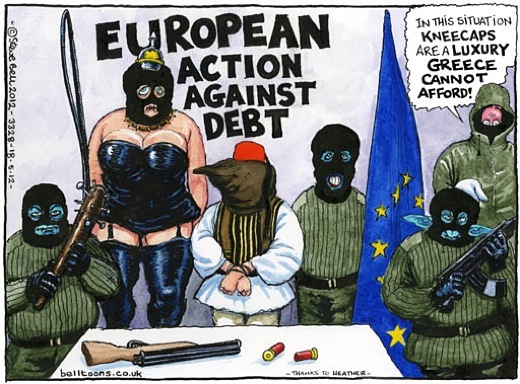SUBHEAD: Greece won’t and can’t pursue the policies that Germany and the European Central Bank are demanding.
By Paul Krugman on 18 May 2012 for the New York Times -
(http://www.nytimes.com/2012/05/18/opinion/krugman-apocalypse-fairly-soon.html)

Image above: Cartoon of action by Europe to save Greece by Steve Bell. From (http://www.guardian.co.uk/commentisfree/cartoon/2012/may/17/greek-debt-crisis-steve-bell-cartoon).
[IB Editor's note: We usually see Paul Krugman as not getting it. He thinks we will spend our way back to growth. However in the op-ed piece he seems to see the light.]
• Paul Krugman is professor of Economics and International Affairs at Princeton University and a regular columnist for The New York Times. Krugman was the 2008 recipient of the Nobel Prize in Economics. He is the author of numerous books, including The Conscience of A Liberal, The Return of Depression Economics, and his most recent, "End This Depression Now!".
.
By Paul Krugman on 18 May 2012 for the New York Times -
(http://www.nytimes.com/2012/05/18/opinion/krugman-apocalypse-fairly-soon.html)

Image above: Cartoon of action by Europe to save Greece by Steve Bell. From (http://www.guardian.co.uk/commentisfree/cartoon/2012/may/17/greek-debt-crisis-steve-bell-cartoon).
[IB Editor's note: We usually see Paul Krugman as not getting it. He thinks we will spend our way back to growth. However in the op-ed piece he seems to see the light.]
This doesn’t have to happen; the euro (or at least most of it) could still be saved. But this will require that European leaders, especially in Germany and at the European Central Bank, start acting very differently from the way they’ve acted these past few years. They need to stop moralizing and deal with reality; they need to stop temporizing and, for once, get ahead of the curve.
I wish I could say that I was optimistic.
The story so far: When the euro came into existence, there was a great wave of optimism in Europe — and that, it turned out, was the worst thing that could have happened. Money poured into Spain and other nations, which were now seen as safe investments; this flood of capital fueled huge housing bubbles and huge trade deficits. Then, with the financial crisis of 2008, the flood dried up, causing severe slumps in the very nations that had boomed before.
At that point, Europe’s lack of political union became a severe liability. Florida and Spain both had housing bubbles, but when Florida’s bubble burst, retirees could still count on getting their Social Security and Medicare checks from Washington. Spain receives no comparable support. So the burst bubble turned into a fiscal crisis, too.
Europe’s answer has been austerity: savage spending cuts in an attempt to reassure bond markets. Yet as any sensible economist could have told you (and we did, we did), these cuts deepened the depression in Europe’s troubled economies, which both further undermined investor confidence and led to growing political instability.
And now comes the moment of truth.
Greece is, for the moment, the focal point. Voters who are understandably angry at policies that have produced 22 percent unemployment — more than 50 percent among the young — turned on the parties enforcing those policies. And because the entire Greek political establishment was, in effect, bullied into endorsing a doomed economic orthodoxy, the result of voter revulsion has been rising power for extremists. Even if the polls are wrong and the governing coalition somehow ekes out a majority in the next round of voting, this game is basically up: Greece won’t, can’t pursue the policies that Germany and the European Central Bank are demanding.
So now what? Right now, Greece is experiencing what’s being called a “bank jog” — a somewhat slow-motion bank run, as more and more depositors pull out their cash in anticipation of a possible Greek exit from the euro. Europe’s central bank is, in effect, financing this bank run by lending Greece the necessary euros; if and (probably) when the central bank decides it can lend no more, Greece will be forced to abandon the euro and issue its own currency again.
This demonstration that the euro is, in fact, reversible would lead, in turn, to runs on Spanish and Italian banks. Once again the European Central Bank would have to choose whether to provide open-ended financing; if it were to say no, the euro as a whole would blow up.
Yet financing isn’t enough. Italy and, in particular, Spain must be offered hope — an economic environment in which they have some reasonable prospect of emerging from austerity and depression. Realistically, the only way to provide such an environment would be for the central bank to drop its obsession with price stability, to accept and indeed encourage several years of 3 percent or 4 percent inflation in Europe (and more than that in Germany).
Both the central bankers and the Germans hate this idea, but it’s the only plausible way the euro might be saved. For the past two-and-a-half years, European leaders have responded to crisis with half-measures that buy time, yet they have made no use of that time. Now time has run out.
So will Europe finally rise to the occasion? Let’s hope so — and not just because a euro breakup would have negative ripple effects throughout the world. For the biggest costs of European policy failure would probably be political.
Think of it this way: Failure of the euro would amount to a huge defeat for the broader European project, the attempt to bring peace, prosperity and democracy to a continent with a terrible history. It would also have much the same effect that the failure of austerity is having in Greece, discrediting the political mainstream and empowering extremists.
All of us, then, have a big stake in European success — yet it’s up to the Europeans themselves to deliver that success. The whole world is waiting to see whether they’re up to the task.
.
No comments :
Post a Comment